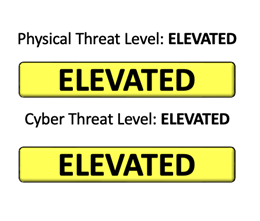Faith-Based Security Headlines
These updates are shared to help raise the situational awareness of Faith-Based organizations to best defend against and mitigate the impacts from all-hazards threats including physical security, cybersecurity, and natural disasters.
Christians, Jews Take Matters into Their Own Hands Amid Surge In Attacks
Christian and Jewish communities across the U.S. are proactively enhancing security at churches, synagogues, and faith-based schools in response to a disturbing rise in violent attacks. The urgency of this threat was highlighted by the August Annunciation Catholic School shooting. The shooting carried out by a transgender who emblazoned his weaponry with slogans like “where is your God,” “Israel must fall”, and “Free Palestine,” signaling a suspected act of anti-religious domestic terrorism. In reaction, HOWs are increasingly training volunteer security teams to manage risks during services, with some even employing armed personnel after active-shooter training.
Between 2018 and 2024, the Family Research Council documented over 1,300 hostile actions targeting churches, including bomb threats, vandalism, arson, and shootings, nearly half occurring in the last two years alone. Jewish communities have likewise intensified precautions, investing approximately $765 million annually in security, bolstered by philanthropic efforts and interfaith collaboration. These measures gained further urgency in the wake of the October 7, 2023, Hamas attack and a spate of antisemitic incidents on U.S. soil, including a deadly shooting outside Washington, D.C.’s Capital Jewish Museum. Programs like FEMA’s Nonprofit Security Grant Program, which has allocated $275 million this year to help faith leaders, provide some assistance, but many in the community are encouraging additional efforts from the government. Earlier this year, US Justice Department grant cuts impacted faith-based organizations.
Analyst Comments: The surge in attacks against Christian and Jewish institutions shows a trend of religious communities feeling increasingly vulnerable and compelled to self-organize for protection. While federal programs like the Nonprofit Security Grant provide some support, the disparity between government funding and private spending shows how faith-based communities are shouldering much of the burden. The turn to armed volunteer security and interfaith collaboration suggests both a resolve among religious groups to safeguard their congregations. The increased threat environment brings additional significance to information sharing amongst faith-based communities in order to build resilience for all. The FB-ISAO recently released our “Attacks on Houses of Worship: 2024 Year in Review”
FBI Releases Special Report about Gang Activity
The report, now available on the FBI’s Crime Data Explorer, complies data submitted by law enforcement agencies via the National Incident-Based Reporting System on gang-related incidents, including murders, aggravated assaults, rapes, and robberies. From 2021 to 2024, over 69,000 incidents involving gang activity were reported, with more than half comprising violent offenses such as homicide, aggravated assault, rape, and robbery. Notably, the majority of offender were 13 to 16 years old, and in most cases, both offenders and victims were familiar with one another. The FBI shows the ongoing, precise, and timely data reporting remains critical for understanding gang dynamics and enhancing responses to gang-related violence.
Analyst Comments: The FBI report shows gangs remain a major driver of violent crime, with most incidents involving serious offenses and many offenders as young as 13-16. The prevalence of victim-offender familiarity suggests community-based conflicts rather than random attacks. These trends highlight the urgent need for early intervention programs for at-risk youth alongside strong law enforcement efforts to track and disrupt gang networks.
Atlantic unusually quiet at hurricane season’s peak, but warm waters to fuel storms soon
Despite reaching the climatological peak of the Atlantic hurricane season around September 10th, the Atlantic basin remains unusually calm, largely due to persistent Saharan dust and dry air suppressing tropical development. However, AccuWeather meteorologists warn that these hindering conditions are forecasted to fade by mid-September, and with sea surface temperatures throughout the main development region remaining anomalously warm, the atmospheres could soon become ripe for a surge in storm activity from the tropics off Africa all the way toward the U.S.
Analyst Comments: The current lull in Atlantic hurricane activity is more of a temporary pause that a sign of a quiet season. While Saharan dust and dry air have held back development, the exceptionally warm sea surface temperatures are a key driver that could quickly tip conditions toward rapid storm formation once atmospheric factors shift. This pattern suggests a heightened risk of multiple storms forming in quick succession later in September and October, which often produce some of the most destructive hurricanes. Emergency planners and coastal communities should consider this time as an opportunity to finalize preparedness measures before conditions could change.
Get the Daily Awareness Post Delivered to your Email!
More Faith-Based Stories
Officials investigate vandalism of Jesus statue at East Texas church
Hindu temple in Dublin robbed of $34,000 in cash, jewelry
B’nai Jeshurun Congregation’s sign target of vandals
Twin Cities Catholic churches tighten security after Annunciation shooting
Trash fire makes mess at Grand Rapids Township church
Milwaukee Lutheran church sues over Trump directive on ICE raids at houses of worship
Madison Diocese responds to ‘devastating’ sex crimes by priest: ‘There is no cover-up’
Ohio man pleads guilty of littering for distributing antisemitic flyers
Pig Heads, Some With ‘Macron’ Scrawled on Them, Found Outside Nine Paris Mosques
Imposing Sanctions on Online Scam Centers in Southeast Asia
Treasury Sanctions Southeast Asian Networks Targeting Americans with Cyber Scams
The Global State of al-Qa`ida 24 Years After 9/11
Ransomware Losses Climb as AI Pushes Phishing to New Heights
Strong Earthquake Strikes Off Oregon Coast
Homeowners insurance is pricing people out in disaster-prone cities
More Security-focused Content






